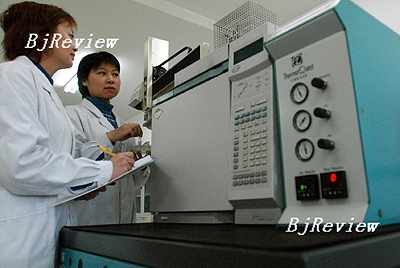
Doping tainted the Athens Olympic Games in 2004. Of the nearly 3,700 tests on banned substances conducted at those games, the number of cases of athletes testing positive for drugs was 24. In a bid to avoid a re-run of those scandals, organizers in Beijing plan to subject athletes to a level of scrutiny and testing never before seen at the Olympics. They will demonstrate their commitment to a drug free Olympics by doing more tests than anyone has done before.
Zhao Jian, head of the Anti-Doping Commission of the Chinese Olympic Committee, said they are well aware that an effective anti-doping program will count in assessing whether the Beijing Olympic Games next year is successful or not. The Anti-Doping Commission will be entrusted to implement the doping control plan for the Beijing Olympic Games where 4,500 dope tests are expected.
"What we want most is a clean Games next year, where athletes from all over the world feel that they are competing fair and square," Zhao said.
Doping tests have risen steadily in recent years, from 2,800 at the Sydney Games in 2000 to 3,700 in Athens in 2004. Between the two Games, the number of positive results more than doubled.
China plans to carry out 4,500 doping tests during the 2008 Beijing Olympics, a 25 percent increase from the Athens Games. Testing will be conducted "round the clock" during the Beijing Olympics. World Anti-Doping Agency (WADA) officials will play an independent observer role at the Olympics and the doping control system will be watching for banned practices such as blood transfusions, urine spiking and tampering with samples.
"The number is usually decided by the host country based on what it is capable of and the IOC's approval," Zhao said. "Although the scale of the tests will be a challenge, we are confident we can manage it."
Zhao's confidence is based on China's anti-doping management system, which won ISO certification, an international quality standard, in April 2004. The country's drug-testing laboratory, which was established in 1989 for the 1990 Asian Games, has passed the IOC's level-A examination for 17 straight years.
Apart from the routine blood and urine sample tests held during the games, the Anti-Doping Commission will randomly hold on-the-spot checks during pre-competition trainings. Drug testers will also possibly adopt additional tests after the games. It is safe to say that the actual number of tests could far exceed 4,500.
A new laboratory is almost ready to meet the heavy demand and will be used at the end of August for some of the Olympic warm-up events. Located in the Olympic Sports Center, at the southern end of the central cluster of Olympic venues, the new lab covers 5,000 square meters and cost the city over 70 million yuan.
"Apart from those for the horses (equestrian events will be staged in Hong Kong), all tests will be conducted in the new lab," said Zhao. "At its peak, there will be over 200 tests a day," he said. Tests will be conducted and monitored by 150 staff members.
According to Wu Moutian, head of the Chinese doping-test laboratory, besides the current 21 staff, 60 will come from professional drug analysis institutions, 50 will be medical students from universities and 20 will be foreign experts. "Inviting foreign experts is an international practice," Wu said.
Wu said that the China Doping Control Center will purchase some special testing equipment with government funding and borrow other materials from Beijing-based institutions to supplement what they already have on hand.
According to Olympic conventions, new drugs will be added to the doping test just before the opening of the Games. Two months before Sydney, erythropoietin (EPO) tests were first carried out. Three months before Athens, the same thing happened with human growth hormone (HGH).
EPO, a blood booster that facilitates the delivery of oxygen, is commonly used to give athletes an advantage in endurance sports like cycling and marathon running. HGH makes it easier for athletes to strip away fat and replace it with muscle by boosting the body's natural supply of the hormones.
"IOC and the World Anti-Doping Agency usually announce new items close to the opening of the Games so athletes have less chance of escaping detection," said Wu. He said it was too early to predict whether new drugs would be added to the test list next year because "the WADA believes it's never too later to introduce new tests."
The additional testing on horses in equestrian events is one highlight of Beijing Olympic Games. The doping test in equestrian events consists of two parts, a test on athletes and a test on horses. The Beijing Anti-Doping Commission will fetch samples of athletes and test them in a Beijing laboratory while entrusting the test on horses to the Equestrian Committee in Hong Kong, said Zhao. | 